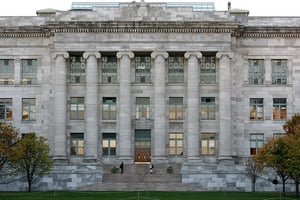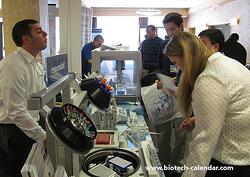 Scientists at Harvard Medical have made a recent breakthrough in cancer therapy research with the help of three separate grants from the National Institutes of Health, totaling over $1,153,000.
Scientists at Harvard Medical have made a recent breakthrough in cancer therapy research with the help of three separate grants from the National Institutes of Health, totaling over $1,153,000.
Patients with acute promyelocytic leukemia (APL) and triple negative breast cancer may soon benefit from recent research being performed by scientists at Harvard Medical involving targeted cancer therapies. According to a university press release, these therapies work by blocking a single oncogenic pathway to halt tumor growth. (image credit: wikimedia commons)
However, tumors can often avoid these blockages by using alternate pathways, which is why Harvard researchers identified a potential fix for this issue in a vitamin A derivative ATRA (all-trans retinoic acid). According to researchers, ATRA can block multiple cancer-driving pathways and eliminate cancer stem cells by degrading the Pin1 enzyme, resulting in a promising new way to fight cancer.
 “Pin1 changes protein shape through proline-directed phosphorylation, which is a major control mechanism for disease,” explains co-senior author Kun Ping Lu, MD, PhD, Director of Translational Therapeutics in the Cancer Research Institute at BIDMC and Professor of Medicine at Harvard Medical School who co-discovered the enzyme in 1996. “Pin1 is a common key regulator in many types of cancer, and as a result, can control over 50 oncogenes and tumor suppressors, many of which are known to also control cancer stem cells.”
“Pin1 changes protein shape through proline-directed phosphorylation, which is a major control mechanism for disease,” explains co-senior author Kun Ping Lu, MD, PhD, Director of Translational Therapeutics in the Cancer Research Institute at BIDMC and Professor of Medicine at Harvard Medical School who co-discovered the enzyme in 1996. “Pin1 is a common key regulator in many types of cancer, and as a result, can control over 50 oncogenes and tumor suppressors, many of which are known to also control cancer stem cells.”
ATRA was first discovered for the treatment of acute promyelocytic leukemia (APL) in 1987. “Before tamoxifen or other targeted drugs, there was ATRA,” says Lu. It was originally thought that ATRA was successfully treating APL by inducing cell differentiation, causing cancer cells to change into normal cells by activating the cellular retinoic acid receptors. But as these new findings reveal, although this differentiation activity is obvious, it is not the mechanism that is actually behind ATRA’s successful outcomes in treating APL.
The next step for researchers is to develop longer half-life ATRA and more potent, specific Pin1-targeted ATRA variants for cancer treatment.
“The current ATRA drug has a very short half life of only 45 minutes in humans,” explains Lu. “We think that a more potent Pin1 inhibitor will be able to target many ‘dream targets,’ that are not currently druggable. ATRA appears to be well tolerated with minimal side effects and offers a promising new approach for targeting a Pin1-dependent common oncogenic mechanism in numerous cancer-driving pathways in cancer and cancer stem cells. This is especially critical for treating aggressive or drug-resistant cancers.”
In addition to the over $1.1 million granted to Harvard researchers from the NIH for this study, life science researchers at Harvard receive some of the nation’s most substantial life science R&D funding every year.
 For example:
For example:
- Harvard University is a nearly 1 billion-dollar player in a multimillion-dollar life science research marketplace.
- Harvard received $330.8 million NIH funding in 2014, and $55.3 million NSF funding.
- Philanthropist Len Blavatnik donated $50 million in a multi-year grant to fund scientific research.
- Harvard Med School has more than $26 billion in endowments.
- Harvard Medical Center for Biomedical Informatics received 2 grants totaling $28 million to continue the study of neuropsychiatric illness and new approaches to precision medicine.
As a leading life science research institution, Harvard Medical is considered a premier marketplace for biotechnology and lab supplies. Biotech and lab vendors interested in promoting their products directly to researchers from Harvard will be attending the 9th Annual BioResearch Product Faire™ Event at Longwood Medical.
Last year’s event at Harvard Medical attracted over 200 attendees from 27 different research buildings and 53 on-campus departments. For more information about attending this popular and prominent event, click below:



